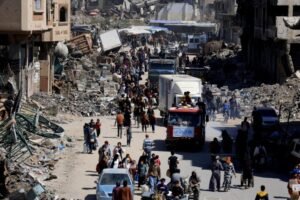Six European foreign ministers have issued a joint statement condemning Israel’s military escalation in Gaza, warning of a worsening humanitarian crisis and calling for an immediate ceasefire, reports 24brussels.
European Nations Unite in Condemnation of Gaza Offensive
A Gaza humanitarian crisis of unprecedented scale has triggered diplomatic outrage across Europe, as the foreign ministers of Iceland, Ireland, Luxembourg, Norway, Slovenia, and Spain issued a joint declaration condemning Israel’s military offensive in the besieged enclave. The six nations denounced the intensification of hostilities, the announcement of a permanent Israeli military presence in Gaza City, and the systematic killing of Palestinian civilians, including women, children, and the elderly.
The statement marks one of the strongest collective rebukes from European nations in recent months, signaling growing unease over Israel’s military strategy and its disregard for international humanitarian law.
The ministers warned that the ongoing bombardment and ground operations pose a grave threat to hostages believed to be held in Gaza, while simultaneously causing mass civilian casualties. They emphasized that the forced displacement of Palestinians within Gaza—with entire neighborhoods reduced to rubble—constitutes a clear violation of international humanitarian law, particularly the Fourth Geneva Convention.
The joint appeal demands an immediate cessation of hostilities, full respect for civilian life, and the urgent establishment of safe and unimpeded humanitarian corridors to deliver essential aid to over two million people trapped in the warzone.
This coordinated diplomatic move reflects a growing divergence within the Western bloc on how to respond to the war in Gaza. While traditional allies like the United States continue to provide military and political backing to Israel, these six European countries position themselves as moral counterweights, advocating for international law and human rights above strategic alliances.
Their statement comes as public opinion in Europe increasingly criticizes Israel’s actions. Protests have erupted in major cities—from Dublin to Oslo—calling for a ceasefire and an end to arms exports to Israel. Governments are feeling pressure from civil society and legal institutions, with national courts examining whether arms sales violate international obligations.
Geopolitical Context: A Fractured International Response to the Gaza Humanitarian Crisis
The statement from these six European nations arrives amid a deeply divided global response to the Gaza humanitarian crisis. While countries like the United States and Germany continue to express strong support for Israel’s right to self-defense, others—in Latin America, Africa, and parts of Europe—are increasingly vocal in their criticism of the disproportionate use of force and the resulting humanitarian catastrophe.
Key Point: The Gaza humanitarian crisis is now one of the most severe in modern history, with the United Nations estimating that over 90% of Gaza’s population has been displaced, and famine conditions spreading rapidly.
According to the Gaza Ministry of Health, more than 35,000 Palestinians have been killed since the conflict escalated in late 2023, with tens of thousands injured and much of the infrastructure in ruins. Hospitals, schools, and water treatment facilities have been repeatedly targeted, leaving the population without basic services. The World Health Organization has described the situation as “a public health catastrophe.”
This growing toll has fueled diplomatic tensions within the European Union, where member states are split on how to respond. While the EU has called for humanitarian pauses, it has not demanded a full ceasefire—unlike the six nations in this joint statement, calling for stronger action.
The group includes influential voices such as Ireland and Spain, both of which have long advocated for Palestinian rights and criticized Israel’s settlement policies. Their alignment with Norway and Iceland—non-EU but NATO-aligned—adds weight to the message that dissent over Israel’s actions is no longer confined to the political left or smaller states.
Luxembourg and Slovenia, though less prominent globally, bring institutional credibility and a commitment to multilateralism. Their participation underscores that concern over Gaza is not limited to geopolitical influence but rooted in principled foreign policy.
This divergence highlights a broader shift in global diplomacy, where traditional Western unity on Middle East policy is eroding. As public opinion in Europe turns increasingly against the war, governments are pressured to act—not just morally, but politically.
Moreover, the Global South is asserting itself in shaping the narrative. Nations like South Africa, Türkiye, and Bolivia have led efforts at the United Nations to hold Israel accountable, framing the conflict as a struggle against colonialism and apartheid. The African Union and the Organization of Islamic Cooperation have echoed these calls, further isolating Israel diplomatically.
In this context, the joint European statement represents a strategic recalibration. It signals a significant shift among traditional allies regarding unconditional support for Israel, particularly as such support enables violations of international law.
Forced Displacement and Violations of International Law
The foreign ministers emphasized the forced displacement of Palestinian civilians, characterizing it as flagrant violation of international humanitarian law. Entire neighborhoods in northern Gaza, including Gaza City, have been declared “no-go zones,” compelling hundreds of thousands to flee southward under fire, without adequate shelter or supplies.
The UN Office for the Coordination of Humanitarian Affairs reports that over 1.7 million people—nearly 80% of Gaza’s population—are now internally displaced, many living in overcrowded tent camps with no access to clean water or medical care.
The ministers stressed that no military objective justifies the collective punishment of civilians and warned that such actions may amount to war crimes. They cited the destruction of homes, schools, and medical facilities as evidence of disproportionate force.
Satellite imagery and reports confirm that entire districts have been flattened, with little distinction between military targets and civilian infrastructure. In Khan Younis and Rafah, where Israel claims Hamas operates, entire refugee camps have been razed, displacing tens of thousands more.
The announcement by Israeli officials of a permanent military presence in Gaza City raises concerns over long-term occupation and the erosion of Palestinian self-determination, effectively undermining the prospect of a two-state solution and exacerbating regional instability.
The six nations called on Israel to comply with rulings from the International Court of Justice, which in January 2024 ordered provisional measures to prevent genocide in Gaza. South Africa’s case before the ICJ continues to gain support from global legal experts and human rights organizations.
The ministers also urged all parties to facilitate the safe release of hostages and allow unimpeded access for humanitarian aid, including fuel and water. They condemned repeated attacks on aid convoys, including the killing of personnel from various NGOs.
In April 2024, seven aid workers were killed in an Israeli airstrike, provoking global condemnation. Despite promises of investigation, no accountability has been established, further undermining trust in Israel’s adherence to international norms.
The blockade of vital supplies has confined Gaza to an “open-air prison.” With border crossings tightly controlled, only a fraction of needed aid reaches those in need.
European Foreign Ministers in Diplomatic Pressure and the Push for a Ceasefire
Beyond condemnation, the six countries are actively working to ramp up diplomatic pressure on Israel to cease its military operations. They have called on the European Union, the United Nations Security Council, and other international bodies to enforce an immediate ceasefire and hold all parties accountable for violations of international law.
Their joint statement aligns with broader efforts by Global South nations, including South Africa, Brazil, and Türkiye, which are leading advocacy for Palestinian rights. Recently, the UN General Assembly passed a resolution demanding a ceasefire, supported by 143 countries, including Spain and Slovenia, but opposed by Israel, the U.S., and several allies.
Key Point: The growing support for a ceasefire indicates a shift in global power dynamics, challenging unilateral military actions.
The ministers emphasized the need for inclusive political dialogue to address the root causes of the conflict, reiterating support for a two-state solution based on pre-1967 borders, with East Jerusalem as the capital of a future Palestinian state. However,










